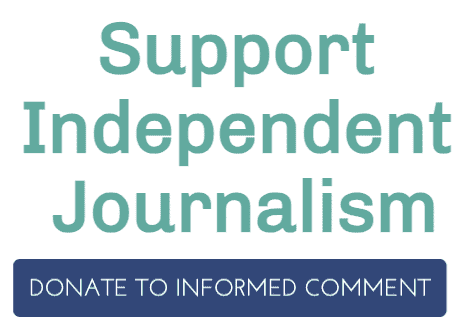State College, Pa. (Special to Informed Comment; Feature) – No one should envy President Biden these days. His reelection effort faces an uphill battle, in large part due to his decisions regarding the war in Gaza.
Though he seemed to earnestly try to do the right thing by backing Israel in a war following the horrific attack by Hamas, President Biden effectively gave Israel his personal authorization to create an unprecedented humanitarian disaster in what was already a crisis-stricken Gaza. Since the war began, the brutal massacre of 1,300 Israelis carried out by Hamas terrorists has given way to a never-ending bombardment that’s led to 1.7 million Palestinians internally displaced from the north Gaza strip to the south, over 18,000 dead—half of them are children—and thousands buried under the rubble.
This does not look like a war on Hamas. It is a total war on the Palestinians. And it continues with Biden’s public support.
Significant parts of the Democratic coalition have responded with calls to boycott the presidential elections. Seventy percent of voters 18-34 express support for the Palestinian struggle (not to be confused with support for Hamas). The writing on the wall could not be more explicit. No Democratic candidate can win without the overwhelming support of young voters and Arab Americans. Even among Jewish communities, Israel is no longer a source of consensus.
The good news is that the politically right thing to do is also the morally right thing to do for Israel, Palestine, and the United States. President Biden still has time to recover—and turn the tables for the future democracy and shared humanity.

How? He might look to the academy for one answer. Two weeks ago, a letter calling for an immediate ceasefire was published and is picking up signatories from prominent intellectuals and community members. The letter called President Biden to shift from managing the conflict to resolving it within a short and reasonable timeframe.
Biden should heed this call—but he must also go beyond the immediate needs and negotiate a lasting coalition to rebuild Gaza. Any reasonable deal will be tied with connecting the Gaza Strip to the West Bank and reuniting it into one political unit under the Palestinian Authority (P.A.).
We are now in a rare moment in which Hamas is de-facto defeated as the ruling power in Gaza—but the only way to ensure it stays this way and prevent long-term deterioration is not to leave a power vacuum. To that end, President Biden ought to propose a plan made up of 6-12-month stages: in the first stage, gather all the Arab countries willing to come to the table (the United Arab Emirates, Bahrain, Saudi Arabia, and probably Egypt, Jordan, Qatar, Morocco), Turkey, and the European Union to assemble global investments in infrastructure and massive construction—a Marshall Plan for Palestine.

Simultaneously, Biden should inform Mahmoud Abbas that his term is over, and that the P.A. should prepare for general elections within six months; he should also tell Israel to release Palestinian political prisoners—first and foremost, the most popular alternative to the current leadership: Marwan Barghouti. A deadline of two years should be given to the establishment of a Palestinian state over the entire territory of the West Bank, East Jerusalem, and the Gaza Strip.

“An Outbreak of Peace,” by Juan Cole, Digital (Dream.Dreamland v.3/ IbisPaint), 2023.
What if Israel (read: Netanyahu) says no? President Biden has much more power than he is willing to wield or even recognize.
If early in his tenure, his supporters hoped he would channel FDR or LBJ, Biden’s imperative now is to channel none other than George H.W. Bush. In 1991, after the Gulf War, Bush wanted to convene the Madrid Peace Conference to start the first direct peace negotiation between Israel and its neighbors. Then-Israeli Prime Minister Shamir knew that any peace agreement would cost Israel giving up the occupied territories and therefore refused to go.
In response, without hesitation, President Bush signaled that refusal was not an option. Indeed, he named a steep price: he asked Congress to postpone a $400m loan guarantee upon which Israel was dependent for housing for the million recent immigrants from the Soviet Union. Because Shamir took the threat to be credible, he turned around within minutes, and Israel sat around the table for the first time with the heads and foreign ministers of Jordan, Syria, Lebanon, and, yes, Palestine (in a joint Jordanian-Palestinian delegation).
The Madrid Conference led to the most important political victory that the Israeli left has ever won, before or since—in 1992, the Labor Party headed by Itzhak Rabin won the elections and formed a peace coalition with support from the Arab parties in the Knesset. It snowballed into the historic Oslo Accord, which was unimaginable only a year earlier when Rabin and Arafat signed the mutual recognition agreement. Israel enjoyed a period of unprecedented economic and diplomatic strength. Countries that had previously refused to have diplomatic relations with Israel turned a new page; Israelis remember the arrival of international brands that arrived only with the hopes of peace.
Biden has an opportunity—and an obligation—to follow his lead. Not only because it would bring renewed stability to the region, but because it may actually protect his chances at keeping the presidency here at home. Such a deal would help to build new bridges between communities; it would help the fight against antisemitism and Islamophobia; and it would give the Democratic coalition new life in preventing a second Trump presidency.
The bottom line is: hope always wins. Biden should remember it well from his 2008 vice presidential campaign. His only viable option to win a second term starts with embracing our hope: a comprehensive peace plan for Israel and Palestine with all the carrots and sticks right there on the table.



 © 2026 All Rights Reserved
© 2026 All Rights Reserved